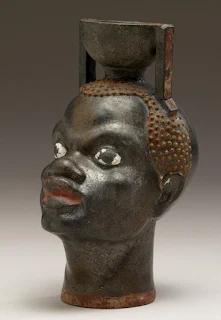THE GREEK HERACLES WAS A BLACK MAN AND THE AFRICAN INFLUENCE ON GREEK AESTHETICS
By Samuel David Ewing
It has occurred to me lately as I pondered about the next article for this section that the lineage, pedigree, or family tree of the Greek Heracles must be clarified once and for all. Diodorus Siculus and Herodotus recorded that it was the Egyptian Heracles who was the hero who performed the legendary 12 Labors, subdued the animals of the wild that had threatened the people, ushered in the building of cities, water systems, fortifications, and laws. Walter Burkert has estimated that this original Heracles was renowned as far back as 20,000 years ago. The Greek Heracles ended up receiving honors for the accomplishments of his predecessor, having the title of "Heracles", furthermore by the Bronze Age of Greece in which the Greek Heracles was said to have lived the taming of the wilderness had already been accomplished. The Greek Heracles was not likely to be wearing lion skin armor, wielding a club, with spear as weapons, and the danger of lions running amok was remote. The Egyptian Heracles did wear lion's skin and or leopard skin (leopards were considered to be lions without manes), he used the spear and club as his weapons, he traveled on foot because there were no chariots during the early history of Egypt, and the black rulers of Egypt were the persons who fit the description of the Egyptian Heracles. Richard Poe, author of BLACK SPARK WHITE FIRE, Did African Explorers Civilize Ancient Europe, Prima Publishing, P.O. Box 1260BK , Rocklin, CA 95677, pg. 316 quotes Diodorus on the differences between the Egyptian Heracles and the Greek Heracles; "By the time the Greek Heracles lived, said Diodorus, "most parts of the inhabited world had already been reclaimed from their wild state by agriculture and cities and the multitude of men settled everywhere over the land". Again quoting Diodorus, Richard Poe reveals; "Likewise, both the club and the lion's skin are appropriate to their ancient [Egyptian] Herakles, because in those days arms had not yet been invented, and men defended themselves against their enemies with clubs of wood and used the hides of animals for defensive armor".
Herodotus' research led him to discover that the most ancient Heracles was Egyptian (a native black African). In Pausanias, 9.38.6-8 (Jones, trans.) Herodotus reports that the Greek Heracles was a black man also; "There is plenty of evidence to prove the truth of this, in particular, that both parents of Herakles - Amphitryon and Alkmene - were of Egyptian origin". The Greek Herakles was a black man? How could this be? Ancient literature by the Greek scholars reveals that:
1. Herakles' parents were descendants of the Egyptian King Danaos who was a native black African of Egypt. The Egyptians, of course were predominantly black people.
2. Herakles' father, Amphitryon and his mother, Alkmene were first cousins, grandchildren of the mighty hero Perseus, who is the great, great, great, great grandson of King Danaos. In addition there was miscegenation between Egyptians and Greeks. One can obviously understand that the Greek Herakles would hardly resemble a European or Caucasian male. In present day American society he would be considered a black man, mulatto or at the very least having a 'biracial background'. This information was gathered by Herodotus who researched the Greek Herakles' pedigree. Apollodorus points to the fact that the Greek Herakles' parents were also descended from Perseus' wife, Andromeda, whose parents were Cepheus and Cassiopeia, the rulers of Ethiopia. Thus we see in the Greek Herakles the hero whose parents are of Ethiopian and Egyptian descent, both groups of people who are native Africans (black people) with some Greek mixture also.
3. Richard Poe further reports on page 317 that the ancient Roman poet, Ovid emphasizes that the beautiful Andromeda was "dark (fusca)". On page 318, BLACK SPARK WHITE FIRE, Richard Poe further clarifies that; "We, of course, have no way of knowing to what extent the Herakles of legend represents a real person. But even if he does not, his portrayal as an African prince-- part Egyptian and part Ethiopian-- suggests that the ancient storytellers held a profoundly different view of Bronze Age Greece than that served up by Hollywood scriptwriters. Rightly or wrongly, ancient tradition places African dynasts at the head of some of Greece's most powerful and prominent cities. It also portrays Herakles as an ambitious hydraulic engineer, responsible for damming rivers and digging canals all over Greece--- an occupation peculiarly appropriate for a prince of an Egyptian royal dynasty". Richard Poe asks these thought provoking questions, "Was Herakles a Paul Bunyan of his time? Do his adventures reflect the achievements of real- life canal diggers and dam builders in early Greece? If so, then the legend implies that those ancient engineers had a strong ancestral link with Africa and particularly with Egypt. It seems more than coincidental that Herakles' great, great, great, great, great, great grandfather Danaos was also remembered, in legend, for his feats of water engineering".
Briefly I want to talk about Zeus, the Supreme Father god who was said to be the Greek Herakles' actual father. Zeus is the name or title of the supreme god of ancient Ethiopians and the Egyptian. He was known as Zeus, Zeus-Ammon, Ausar, Khnum, Ammon- Zeus, and Ethiops. The ancient Greeks' religion was copied from the ancient Ethiopians and Egyptians from whom they learned spiritual and religious teachings. The Greeks and Romans referred to Zeus using the African titles previously mentioned in addition calling him Serapis, Jupiter, Jove, Zagreus, Dionysus, and Osiris.
Joel A. Rogers, author of “Nature Knows No Color Line”, reports; "Negroes were first worshipped in Greece and Rome. White masses bowed down to black deities. The rites of Apollo were founded by Delphos and his Negro mother, Melainis; and the worship of black Isis and Horus were popular in Rome and the Roman colonies as far north as Britain. When this later evolved into the worship of the Black Madonna and the Black Christ, Christian Whites also bowed down to them. Negroes, as was said, were deified in the early Greece. They appear as gods in Greek mythology. The chief title of Zeus, greatest of the Greek gods, was 'ETHIOPS', that is 'BLACK'".
In addition to this information the same Ethiops or Zeus is the historical king named CUSH who ruled over the native African peoples (the black race, the Hamites ).
Godfrey Higgins, author of ANACALYPSIS, Vol. 1, published by A & BOOKS PUBLISHERS, 149 Lawrence Street, Brooklyn, New York, 11201, reports that; "In my research for the origin of the Ancient Druids, I continually found, at last, that my labors terminated with something black. Thus the Oracles of Dodona and of Apollo at Delphi were founded by Black Doves. Doves are not often, I believe, never black. Osiris and his Bull were black, at least this was the case with Jupiter, Bacchus, Hercules, Apollo, Ammon. The goddesses Venus, Isis, Hecati, Juno, Metis, Ceres, Cybele were black in the Campdoglio in Rome". Higgins further states on page 286 of the same book; "We have found the black complexion or something relating to it whenever we have approached the origin of nations......... or first idols were black". J.A. Rogers, author of Sex And Race, Vol.1, New York, 1967 reports; ".......the earliest gods and messiahs on all the continents were black."
The ancient Greeks, ancestors of some of the present Greek peoples readily admitted that they were descendants of Ethiopians (native African black people of Ethiopia) and the Europeans of ancient times. The ancient Greeks, with pride tell the story of how Zeus (Cush, first Ethiopian Ruler ) and the prototype for the king of the Olympian gods, made love to the white-skinned IO, who gave birth to Epaphus, a mulatto male.
This story which was one of many reveals the Greeks acknowledging their biracial heritage. In Sex And Race, Vol.1, J.A. Rogers has this to say, "As was said several scientists, among them Sergei, declare that the Europeans, especially those of the Meditteranean, are, strictly speaking, Eur- Africans. Thus we find anthropology supporting mythology".
Archaeologist have found numerous vases, statues and other forms of art from the Archaic Period of Ancient Greece in which the native Greek people portray themselves as Africans and as people having a mixture of African and European features. The constant miscegenation between the people of Ancient Crete (Western Ethiopians) and the Europeans, during 2000-1200 B.C. was a well known fact to the Archaic Greeks. Andromeda, Perseus' wife is shown on a terracotta vase, from the 4th century B.C. as the beautiful black woman that she was. Is there any proof that the ancient Greeks of the of the Archaic Period acknowledged and portrayed Heracles (HERCULES) as a black man? YES THERE IS! In the Oesterreichisches Museum, Vienna was kept the Ionian 'Caeratan' hydria (very large water jar), made during the middle of the 6th Century B.C. The title of the art work on the hydria is 'HERAKLES AND BUSIRIS KING OF EGYPT'. This art reveals the Greek Herakles as an enormously muscled black African giant who is crushing evildoers beneath his feet, strangling and breaking the necks of evildoers with his bare hands, as well as by trapping their throats between his elbow and bicep region, in his left hand he is holding a man in the air by his left ankle using the superhuman might of his left arm, and finally the rest of the evildoers are fleeing from the Greek Herakles in terror. The story has to do with Herakles putting a stop to human sacrifices which were instituted by an evil group of cultist under the direction of King Busiris of Egypt. Heracles allowed them to attempt to use him as a sacrifice, then at the right moment he broke his bonds, slaying 1000 cultists including the king. The story resembles that told of Samson.*** The point to be emphasized here is that the Greek Herakles was originally thought of as a BLACK MAN by the ancient Greek peoples before his features were altered by the later Eurocentric influence centuries later.
The Greek Heracles as a black man on this hydria is shown slaying black men (Egyptians) who have features like himself, such as black skin, flat nose, flaring nostrils, large lips, and the wooly textured hair of Hamites. This same Herakles is also shown slaying fair skinned Greeks, and Europeans, the difference between these opponents and Herakles the black man leaves know room for doubt concerning who is of what race.
Martin Bernall, author of BLACK ATHENA, VOL. 1, pages 476- 477 has this to say about this particular hydria; ".....While both point out that Bousiris has black attendants and that Bousiris himself is portrayed as one on another vase, neither Boardman nor Snowden ( 1970, p.159 ) mentions the fact that the 'Greek hero Herakles' is depicted as a curly-haired African Black. This is something that the Aryan Model is completely unable to handle. For reasons that Herakles should have been seen this way, see Vol.3." I would like to add that I have seen photo-prints of this vase myself therefore I know Martin Bernall is telling the truth! Finally apparently it isn't mentioned that an equal amount of Bousiris' attendants on this vase are obviously European.



